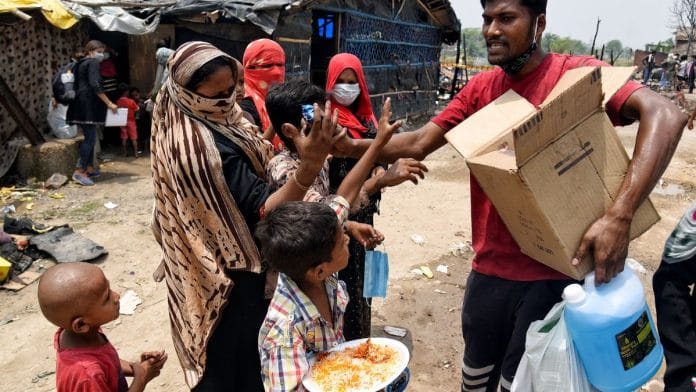Thank you dear subscribers, we are overwhelmed with your response.
Your Turn is a unique section from ThePrint featuring points of view from its subscribers. If you are a subscriber, have a point of view, please send it to us. If not, do subscribe here: https://theprint.in/subscribe/
In an era where human displacement is increasingly becoming a global concern, the plight of the Rohingya people serves as a stark reminder of the vulnerabilities faced by stateless populations. Weaponised statelessness, where governments exploit citizenship laws to control and marginalise minorities, has led to forced displacement on an unthinkable scale. This blog post explores the implications of this crisis, underscoring the urgent need for robust human rights protections. Together, we will delve into the causes of this statelessness, the resultant humanitarian crisis, the role of international law, and the necessary steps towards ensuring better protections for the Rohingya.
What is Statelessness?
Statelessness occurs when an individual does not hold citizenship in any country. This lack of nationality can render individuals vulnerable to a multitude of human rights abuses, as they are often denied basic legal protections and entitlements.
The Weaponisation of Statelessness:
In the context of the Rohingya, the government of Myanmar has systematically disenfranchised this ethnic minority, stripping them of their citizenship through discriminatory laws. Articles of Myanmar’s 1982 Citizenship Law effectively render the Rohingya stateless:
- Denial of citizenship based on ethnicity
- Exclusion from national statistics and identity verification processes
- Inability to access essential public services such as healthcare and education
“The denial of citizenship is not just a legal disability; it is a profound disintegration of an individual’s identity.” – Human Rights Watch
Forced Displacement: The Rohingya Exodus
The Scale of Displacement:
The Rohingya crisis has resulted in one of the largest forced migrations in recent history. In 2017 alone, over 700,000 Rohingya fled Myanmar to escape violence, persecution, and systemic oppression. Many sought refuge in Bangladesh, where they now reside in overcrowded refugee camps, struggling to survive under challenging conditions.
Humanitarian Impact
The impact of forced displacement on the Rohingya people is devastating:
- Health Risks: Refugees face a lack of proper healthcare, leading to heightened vulnerability to diseases.
- Educational Barriers: Children in refugee camps often lack access to education, leading to a lost generation.
- Psychosocial Strain: The trauma of violence and displacement can lead to long-term mental health issues, complicating recovery prospects.
The Role of Host Nations:
While countries like Bangladesh have shown immense hospitality, the prolonged nature of this crisis has strained resources and created tensions. As host nations grapple with the influx, there is a pressing need for international support and solidarity.
International Law and Human Rights Protections:
The Framework of International Refugee Law
International law, particularly the 1951 Refugee Convention and its 1967 Protocol, outlines the rights of those recognised as refugees and the obligations of states to protect them. However, the Rohingya’s stateless status complicates their access to these protections.
Key Provisions:
- Non-Refoulement Principle: This prohibits the return of refugees to countries where they face threats to their safety.
- Right to Asylum: The right to seek asylum is fundamental for those fleeing persecution, and this right should be upheld universally.
Strengthening Protections:
The international community must act to address the deficiencies in human rights protections for the Rohingya:
- Advocating for Myanmar’s accountability through legal channels.
- Supporting the resettlement options for Rohingya refugees in third countries.
- Fostering international cooperation to provide humanitarian aid and development assistance in host countries.
A Path Forward: Engaging Stakeholders for Change
The Role of Civil Society:
Grassroots organisations have been pivotal in advocating for the rights of stateless individuals globally. Their efforts underscore an essential truth: change is often best driven by local voices.
International Organisations and Governments:
Global leaders must prioritise the Rohingya crisis in diplomatic discussions.
- Encourage dialogue between Myanmar and Rohingya representatives.
- Facilitate comprehensive regional strategies that involve ASEAN and other stakeholders.
Grassroots Initiatives:
Engagement at the community level can foster understanding and support for the Rohingya:
- International awareness campaigns to educate about statelessness.
- Collaboration with local NGOS to provide immediate support to refugees.
Conclusion:
The Rohingya crisis is a complex interplay of statelessness, forced displacement, and systemic human rights violations. It highlights the urgent need for enhanced protections and the moral obligation of the international community to act. By advocating for the rights of stateless individuals and ensuring necessary protections, we can work towards a future where every person is recognised, valued, and free from the spectre of statelessness.
As global citizens, we cannot turn a blind eye to the plight of those in desperate need. It’s time to speak out, demand accountability, and foster inclusive policies that recognise the dignity of all people, including the Rohingya.
These pieces are being published as they have been received – they have not been edited/fact-checked by ThePrint.


